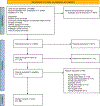Optimal Emergency Department Care Practices for Persons Living With Dementia: A Scoping Review
- PMID: 35940683
- PMCID: PMC12328016
- DOI: 10.1016/j.jamda.2022.05.024
Optimal Emergency Department Care Practices for Persons Living With Dementia: A Scoping Review
Abstract
Objectives: To summarize research on optimal emergency department (ED) care practices for persons living with dementia (PLWDs) and develop research priorities.
Design: Systematic scoping review.
Settings and participants: PLWDs in the ED.
Methods: The following Patient-Intervention-Comparison-Outcome (PICO) questions were developed: PICO 1, What components of emergency department care improve patient-centered outcomes for persons with dementia? PICO 2, How do emergency care needs for persons with dementia differ from other patients in the emergency department? A scoping review was conducted following PRISMA-ScR guidelines and presented to the Geriatric Emergency care Applied Research 2.0 Advancing Dementia Care network to inform research priorities.
Results: From the 6348 publications identified, 23 were abstracted for PICO 1 and 26 were abstracted for PICO 2. Emergency care considerations for PLWDs included functional dependence, behavioral and psychological symptoms of dementia, and identification of and management of pain. Concerns regarding ED care processes, the ED environment, and meeting a PWLD's basic needs were described. A comprehensive geriatric assessment and dedicated ED unit, a home hospital program, and a low-stimulation bed shade and contact-free monitor all showed improvement in patient-centered or health care use outcomes. However, all were single-site studies evaluating different outcomes. These results informed the following research priorities: (1) training and dementia care competencies; (2) patient-centric and care partner-centric evaluation interventions; (3) the impact of community- and identity-based factors on ED care for PLWDs; (4) economic or other implementation science measures to address viability; and (5) environmental, operational, personnel, system, or policy changes to improve ED care for PLWDs.
Conclusions and implications: A wide range of components of both ED care practices and ED care needs for PLWDs have been studied. Although many interventions show positive results, the lack of depth and reproducible results prevent specific recommendations on best practices in ED care for PLWDs.
Keywords: Emergency department; cognitive impairment; dementia.
Copyright © 2022 The Authors. Published by Elsevier Inc. All rights reserved.
Conflict of interest statement
The authors declare no conflicts of interest.
Figures
References
Publication types
MeSH terms
Grants and funding
LinkOut - more resources
Full Text Sources
Medical



